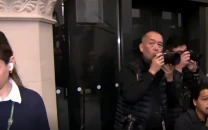7 surprising things about Beethoven
Beethovan's are featured on the Golden Record that is flying around space probes Voyager 1 and Voyager 2

1. A hit in Japan
In 1983, 10,000 people in Japan joined their voices in song to perform the choral finale of Beethoven's 9th Symphony. The amateur choir rehearsed for months in numerous individual groups all over the country to sharpen their skills — and practice the German lyrics. Now, the tradition takes place every year, and the song can be heard throughout the holiday season. The enthusiasm for the Ninth goes back to a performance by German soldiers during the World War I: in 1918 they sang the Ode to Joy in a Japanese prisoner of war camp. Many Japanese simply call the work Daiku, which means "the great."
2. Nature boy
Already during Beethoven's lifetime in the early industrial period, cities were chaotic: Exhaust fumes from steam engines choked the air and carriages rolling over cobblestones caused a din. To escape city life, Beethoven often fled to the outskirts of Vienna. "My unfortunate hearing does not bother me here. Sweet silence of the forest!" he wrote of these retreats. The composer dedicated the sixth of his nine symphonies to nature: Pastoral Symphony or Memories of Country Life/ More the Expression of Feeling than Tone-Painting is the full title of the work. The nature lover imagined landscapes and experiences while he composed. He named individual movements, for example 'Scene by the brook'; 'Merry gathering of country folk'; 'Thunder Storm' or 'Shepherd's song'. These themes are audible in his composition: The orchestra imitates bird calls and we hear the brook's babbling currents.
3. A celebrity funeral
Many artists do not reach the level of fame they hoped for during their lifetime. However, this was not the case for Beethoven. The composer was a veritable superstar of his time. His funeral was attended by 20,000 people — about half the population of Vienna's inner city. Schools were closed and the military was dispatched to preside over the services. His coffin was accompanied by the most important musicians and artists of Vienna, including Franz Schubert and the poet Franz Grillparzer, who wrote a moving eulogy for the funeral that actor Heinrich Anschütz recited.
 Two of Beethoven's works are flying around space on the Golden Record on space probes Voyager 1 and Voyager 2
Two of Beethoven's works are flying around space on the Golden Record on space probes Voyager 1 and Voyager 24. A musical greeting to aliens
They say it's the first impression that counts. So when aliens first make contact with human culture, what might they hear? Beethoven's music. Since 1977, the space probes Voyager 1 and Voyager 2 have been traveling beyond our solar system. On board is the Golden Record, a gold-plated copper plate with graphics, sounds and music. Beethoven is not the only musical ambassador — Bach, Mozart, Stravinsky and a number of ethnic songs and chants are also on board. Among the 27 titles, the following two Beethoven works are currently making their way around the galaxy: The 5th Symphony (1st movement) and the String Quartet No. 13 in B flat major op. 130 (5th movement).
5. A European Anthem
In 1972, the Council of Europe declared the Ode to Joy, the final movement of the 9th Symphony, the official anthem of the EU. The choral finale, however, had to be shortened considerably. Its original length of 25 minutes was too long for events and receptions. Star conductor Herbert von Karajan was selected to arrange bars 140 to 187 for wind instruments. Unlike the original, the modified version does not have lyrics, which caused a sensation at the premiere. This was likely due to the multilingualism of the European Union and the diplomatic attempt not to choose one language over another. But the spirit of the original text, written by Friedrich Schiller, is nevertheless inherent in the European Anthem. "With his Ode to Joy, Schiller expressed his idealistic vision that all people would become brothers — a vision that Beethoven shared," says the European Union's website. "Without words, and only in the universal language of music, it expresses the bloc's values of freedom, peace and solidarity."
 Star director Herbert von Karajan (pictured) was chosen to modify Beethoven's Ode to Joy when it was selected as the anthem of the EU
Star director Herbert von Karajan (pictured) was chosen to modify Beethoven's Ode to Joy when it was selected as the anthem of the EU6. Time traveling
Thanks to sheet music and scores, Beethoven's oeuvre has survived the past two centuries. But how did it sound originally? Back then, instruments functioned differently and venues had different resonances than today's modern concert halls, such as Berlin's Philharmonie. Since 2014, the Orchester Wiener Akademie in Vienna has been attempting to find out by playing historical instruments at the remaining original locations from Beethoven's time. The project, called RESOUND Beethoven, positions the orchestra, choir and audience in historical halls in Vienna where the composer premiered his pieces.
7. Famous last words
Ludwig van Beethoven is said to have said farewell on his deathbed in 1827 with the words "It's a shame, a shame — too late!" ("Schade, schade, zu spät!" in German). However, the composer was not referring to his final musical activities but rather to wine that was about to be delivered. Beethoven is said to have been a heavy drinker. Some sources say that the musical genius drank three bottles of wine a day.
Have something to add tot he story? Share in the comments below



















COMMENTS
Comments are moderated and generally will be posted if they are on-topic and not abusive.
For more information, please see our Comments FAQ